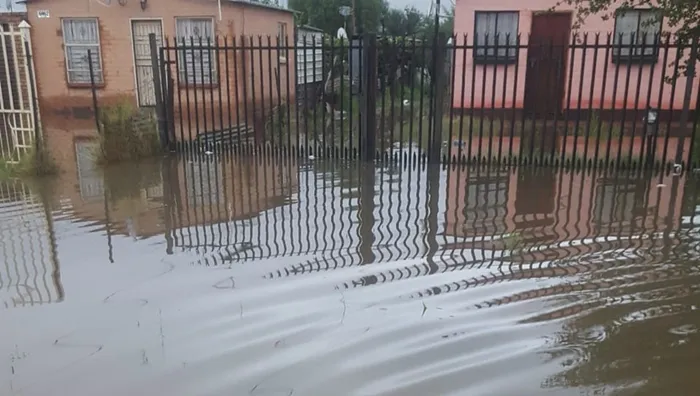
Club 2000 residents are demanding compensation for their flooded homes.
Image: Supplied
Properties and infrastructure left in ruins by recent storms and excessive rain in certain parts of South Africa serve as another stark reminder of how vulnerable supply chains are to natural disasters.
The frequency and severity of floods and storms in South Africa have intensified dramatically over the past decade, with projections pointing to continued escalation, according to a new study published in the "Environmental Development" journal.
“Extreme weather can no longer be treated as a rare disruption,” says Leon Bruwer, managing director of sales for Sub-Saharan Africa at FedEx. “It’s something we’re seeing more regularly. The key to managing this rising risk lies in solid preparation, which, increasingly, ties into digital readiness.”
This meant that for logistics providers, the growing unpredictability of weather is fast becoming a factor that needs to be built into daily planning.
The result is not only localised damage but significant knock-on effects for businesses reliant on timely deliveries, including retailers, manufacturers and healthcare providers.
In the United States, FedEx says it has developed a robust digital weather contingency playbook that allows its operations teams to respond proactively rather than reactively.
In South Africa, where infrastructure is already under strain, the logistics company says these capabilities are particularly relevant. For example, it says the severe weather disruptions in KZN storms in June have damaged roads and power lines across rural areas, cutting off access to several communities.
For a company like FedEx, which serves over 220 countries and territories, having the ability to pre-empt and navigate such disruptions is a strategic advantage, it says.
“Delivery expectations don’t stop when the weather turns,” says Bruwer. “Whether we’re delivering vital healthcare shipments or facilitating the transportation of e-commerce parcels to remote locations, our customers rely on us to keep going.”
FedEx says innovations such as SenseAware deliver high visibility across shipments in near real-time. SenseAware delivers full monitoring and tracking with an unprecedented degree of detail, including humidity, location and light exposure.
Businesses can enjoy peace of mind knowing they have visibility of their shipment from end-to-end, across networks of connected sensors collecting and sending data. To help them stay on track, alerts are sent out immediately if any negative incidents occur.
As extreme weather events become more frequent, Bruwer believes the logistics industry must shift its mindset from resilience to readiness.
“We can’t change the forecast,” he says, “but we can change how we plan for it. At FedEx, we’re not merely reacting to climate disruption, we’re building the systems that enable us to deliver through it.”
Meanwhile, insurable interest, an insurance concept underpinning every insurance policy, often gets misunderstood, says Willem Coetzee, CEO of Zenith.
“Simply put, you can only insure something if its loss or damage would cause you a financial setback,” Coetzee explains.
“So, if you do not stand to suffer financial loss directly from loss of or damage to an insured item, insurance will not cover such loss or damage. The lack of insurable interest, in essence, invalidates any expectation of indemnification.
“Without insurable interest in property under a non-life insurance contract at the time of physical loss or damage, the cover is unenforceable.”
In the context of non-life insurance, which offers cover for motor vehicles and property, legal liability-insurable interest typically arises through ownership or legal responsibility.
For example, a person who owns a car or a house will have an insurable interest in that asset, as they would suffer a financial loss if it were damaged in some capacity or destroyed.
Where things can become a little more complicated, says Coetzee, is in cases involving trust and corporate structures, layered ownership, or assumptions regarding financial interest. “At Zenith, where we serve high-net-worth individuals and families, we observe how complex asset ownership through trusts, companies, and co-ownership often creates uncertainty about insurable interest.”
For example, Family Trust A owns 45% of a holding company, which fully owns a subsidiary that owns a motor vehicle. If a trust beneficiary insures a vehicle of the subsidiary company in their own name, they will lack insurable interest,” explains Coetzee.
To avoid this outcome, the entity that owns the property or has a legal obligation to insure the property should take out the insurance.
Zenith says another common mistake relating to insurable interest is attempting to insure furniture or other assets in a rented property. “Unless your lease agreement specifically states that you’re responsible for the landlord’s belongings, you don’t have an insurable interest in insuring those items,” Coetzee explains.
“In that case, the landlord should be the one insuring these items. So, if you are contractually liable for any damage to the furniture or fittings in your rented home, make sure your policy covers this and that it’s clearly backed by a legal agreement.”
Coetzee says one of the lesser-known requirements is that insurable interest must exist at the time of the insured event.
“If a policyholder sells an asset to a buyer, the buyer must pay the purchase price, and the policyholder must place the buyer in possession of the property in terms of the contract. The policyholder will retain insurable interest even after having received payment, but only up to the time of transferring possession.
"Should the policyholder have transferred possession of the property, but payment has not been received, the policyholder will retain insurable interest until having been paid,” Coetzee explains.
The company says problems arising from a lack of insurable interest are easily avoidable. “First and foremost, you should always disclose any ownership structures, joint ownerships, usage rights, contractual liabilities or third-party interests clearly and upfront, not after the fact,” says Coetzee.
“An experienced adviser who understands your financial structure will then be able to identify any potential gaps to ensure you are properly covered,” he says.
Independent Media Property
Related Topics: